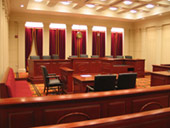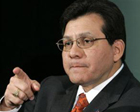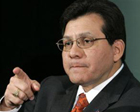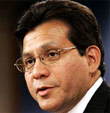|
|
|
Judge dismisses lawsuit against Rumsfeld
Law Center |
2007/03/30 01:54
|
| Former Defense Secretary Donald H. Rumsfeld cannot be tried on allegations of torture in overseas military prisons, a federal judge said Tuesday in a case he described as "lamentable." U.S. District Judge Thomas F. Hogan threw out a lawsuit brought on behalf of nine former prisoners in Iraq and Afghanistan . He said Rumsfeld cannot be held personally responsible for actions taken in connection with his government job. Lawyers for the American Civil Liberties Union and Human Rights First had argued that Rumsfeld and top military officials disregarded warnings about the abuse and authorized the use of illegal interrogation tactics that violated the constitutional and human rights of prisoners. "This is a lamentable case," Hogan began his 58-page opinion Tuesday. "Despite the horrifying torture allegations," Hogan said, he could find no case law supporting the lawsuit, which he previously had described as unprecedented. Allowing the case to go forward, Hogan said in December, might subject government officials to all sorts of political lawsuits. Even Osama bin Laden could sue, Hogan said, claiming two American presidents threatened to have him murdered. Had the Rumsfeld lawsuit been allowed to go forward, attorneys for the ACLU might have been able to force the Pentagon to disclose what officials knew about abuses such as those at Abu Ghraib prison in Iraq and what was done to stop it. The Justice Department had no immediate comment. Karpinski, whose Army Reserve unit was in charge of the Abu Ghraib prison, was demoted and is the highest-ranking officer punished in the scandal. Sanchez, who commanded U.S. forces in Iraq, retired from the Army and said his career was a casualty of the prison scandal. |
|
|
|
|
|
|
Gonzales aide testifies about firings
Law Center |
2007/03/29 09:13
|
| Eight federal prosecutors were fired last year because they did not sufficiently support President Bush's priorities, Attorney General Alberto Gonzales' former chief of staff said today, a standard that Democrats called "highly improper." "The distinction between 'political' and 'performance-related' reasons for removing a United States attorney is, in my view, largely artificial," Kyle Sampson told the Senate Judiciary Committee. "A U.S. attorney who is unsuccessful from a political perspective ... is unsuccessful." Democrats on the panel immediately rejected the concept of mixing politics with federal law enforcement. They accusing the Bush administration of cronyism and trying to circumvent the Senate confirmation process by installing favored GOP allies in plum jobs as U.S. attorneys. "It corrodes the public's trust in our system of Justice. It's wrong," said Judiciary Committee Chairman Patrick Leahy. "When anybody tries a backdoor way to get around the Senate's constitutional duty and obligation of advise and consent, it does not sit well." After being sworn, Sampson, who quit earlier this month amid the furor, disputed Democratic charges that the firings were a purge by intimidation and a warning to the remaining prosecutors to fall in line. Nor, he said, were the prosecutors dismissed to interfere with corruption investigations. "To my knowledge, nothing of the sort occurred here," Sampson told the committee. |
|
|
|
|
|
|
Gonzales loses allies in Republican ranks
Law Center |
2007/03/28 06:16
|
Attorney General Alberto Gonzales' allies on Capitol Hill have grown more scarce as he left it largely to aides to carry out President Bush's order to straighten out the story behind the firing of eight federal prosecutors. Senate Republicans leaving their weekly policy lunch Tuesday no longer bothered to defend Gonzales' response to lawmakers' questions about the firings. At most, they mustered an appeal to withhold judgment until the attorney general testifies before the Senate Judiciary Committee on April 17. That was Sen. Arlen Specter's message during the closed-door meeting, according to three senators who were present. "Senator Specter today said to give (Gonzales) a fair chance," said Sen. Jeff Sessions, an Alabama Republican and a staunch White House ally who lunched with Gonzales last week. "I think people are trying to do that. But there are some inconsistent stories he (Gonzales) is going to have to explain." Among them: Why Gonzales said March 13 that he "never saw documents" and "never had a discussion" about the firings. Recently released documents show he participated in an hourlong meeting and approved a detailed plan on the dismissals 10 days before they were carried out. Gonzales has maintained he was not closely involved in the firings, and did not help select which prosecutors would be told to resign. |
|
|
|
|
|
|
DOJ Official Won't Testify About Firings
Law Center |
2007/03/27 14:39
|
| A senior aide to Attorney General Alberto Gonzales has decided against testifying before lawmakers about her role in the ousters of eight federal prosecutors, the latest flare-up in the controversy surrounding the Justice Department. Monica Goodling's announcement that she would take the Fifth Amendment to avoid possibly incriminating herself came as the embattled attorney general cast himself as misunderstood in his conflicting accounts of his involvement in the firings. Goodling is the Justice Department's liaison to the White House. Gonzales was to be in Cincinnati and Chicago on Tuesday in the latest leg of a multistate tour to promote a crackdown on child sex abuse and soothe U.S. attorneys who might be smarting over the dismissals. Fending off calls for his resignation, Gonzales on Monday said he was "really pained" by Republicans and Democrats who say he has lost his credibility in dealing with the firings. A growing number of critics say the dismissals were politically motivated. He sought to stem the furor over his March 13 statement that he "never saw documents" and "never had a discussion" about the firings. His schedule for last Nov. 27 showed he participated in an hourlong meeting and approved a detailed plan on the dismissals. He maintained he was not closely involved in the firings, and did not help select which prosecutors would be told to resign. |
|
|
|
|
|
|
Gonzales aide to invoke Fifth Amendment
Law Center |
2007/03/27 06:50
|
| Attorney General Alberto Gonzales‘ liaison with the White House will refuse to answer questions at upcoming Senate hearings about the firings of eight U.S. attorneys, citing her Fifth Amendment protection against self-incrimination, her lawyer said Monday. The revelation complicated the outlook for Gonzales, who is traveling out of town this week even as he fights to keep his job. Asked why he would want to remain as attorney general amid so many calls for his ouster, Gonzales said he‘s been asking himself lately whether it‘s appropriate for him to stay in his job. But, he said, "at the end of the day, it‘s not about Alberto Gonzales. It‘s about this great Department of Justice that does so many wonderful things for the American people." The House voted 329-78 to strip the attorney general of his power to indefinitely appoint federal prosecutors, approving a bill similar to one passed in the Senate. President Bush , who is standing by Gonzales, has signaled that he will not veto the legislation. |
|
|
|
|
|
|
U.S. judge blocks 1998 online porn law
Law Center |
2007/03/22 09:02
|
| A federal judge on Thursday dealt another blow to government efforts to control Internet pornography, striking down a 1998 U.S. law that makes it a crime for commercial Web site operators to let children access "harmful" material. In the ruling, the judge said parents can protect their children through software filters and other less restrictive means that do not limit the rights of others to free speech. "Perhaps we do the minors of this country harm if First Amendment protections, which they will with age inherit fully, are chipped away in the name of their protection," wrote Senior U.S. District Judge Lowell Reed Jr., who presided over a four-week trial last fall.
The law would have criminalized Web sites that allow children to access material deemed "harmful to minors" by "contemporary community standards." The sites would have been expected to require a credit card number or other proof of age. Penalties included a $50,000 fine and up to six months in prison.
Sexual health sites, the online magazine Salon.com and other Web sites backed by the American Civil Liberties Union challenged the law. They argued that the Child Online Protection Act was unconstitutionally vague and would have had a chilling effect on speech. The U.S. Supreme Court upheld a temporary injunction in 2004 on grounds the law was likely to be struck down and was perhaps outdated. Technology experts said parents now have more serious concerns than Web sites with pornography. For instance, the threat of online predators has caused worries among parents whose children use social-networking sites such as News Corp.'s MySpace. The case sparked a legal firestorm last year when Google challenged a Justice Department subpoena seeking information on what people search for online. Government lawyers had asked Google to turn over 1 million random Web addresses and a week's worth of Google search queries. A judge sharply limited the scope of the subpoena, which Google had fought on trade secret, not privacy, grounds. To defend the nine-year-old Child Online Protection Act, government lawyers attacked software filters as burdensome and less effective, even though they have previously defended their use in public schools and libraries. "It is not reasonable for the government to expect all parents to shoulder the burden to cut off every possible source of adult content for their children, rather than the government's addressing the problem at its source," a government attorney, Peter D. Keisler, argued in a post-trial brief. Critics of the law argued that filters work best because they let parents set limits based on their own values and their child's age. The law addressed material accessed by children under 17, but applied only to content hosted in the United States. The Web sites that challenged the law said fear of prosecution might lead them to shut down or move their operations offshore, beyond the reach of the U.S. law. They also said the Justice Department could do more to enforce obscenity laws already on the books. The 1998 law followed Congress' unsuccessful 1996 effort to ban online pornography. The Supreme Court in 1997 deemed key portions of that law unconstitutional because it was too vague and trampled on adults' rights. The newer law narrowed the restrictions to commercial Web sites and defined indecency more specifically. In 2000, Congress passed a law requiring schools and libraries to use software filters if they receive certain federal funds. The high court upheld that law in 2003. |
|
|
|
|
|
|
Making a list of reasons for firing US attorneys
Law Center |
2007/03/21 00:36
|
| Senior Justice Department officials began drafting memos this month listing specific reasons why they had fired eight U.S. attorneys, intending to cite performance problems such as insubordination, leadership failures and other missteps if needed to convince angry congressional Democrats that the terminations were justified. The memos, organized as charts with entries for each of the federal prosecutors and labeled "for internal DOJ use only," offer new details about disputes over policy, priorities and management styles between the department and several of its U.S. attorneys. The prosecutors' shortcomings also were listed in a talking-points memo, indicating the willingness of the Justice Department to make public what are normally confidential personnel matters in order to counter its critics. Justice Department officials hoped that documenting specific reasons for terminating the prosecutors would satisfy demands for more information after Atty. Gen. Alberto R. Gonzales and his deputy, Paul J. McNulty, described the dismissals as vaguely "performance-related." According to the charts, as well as e-mails and other documents made public Monday and Tuesday, Carol C. Lam in San Diego was dismissed for not prosecuting more firearms and border smuggling cases, and for repeatedly missing deadlines. David C. Iglesias in Albuquerque traveled so much he was considered an "absentee landlord." In San Francisco, where Kevin Ryan was fired, "the office has become the most fractured office in the nation, morale has fallen to the point that it is harming our prosecutorial efforts and [Ryan] has lost the confidence of many of the career prosecutors who are leaving the office." The justification was equally sweeping for Paul Charlton in Phoenix: "Repeated instances of insubordination, actions taken contrary to instructions, and actions that were clearly unauthorized." As for Margaret M. Chiara in Grand Rapids, Mich., the memo advised saying nothing about her dismissal because she had not made public statements in her defense. But the memo also said that "if pushed," the department should say morale in her office was low and that Chiara had lost the support of her staff. The documents show that in a separate chain of e-mails, former White House Counsel Harriet E. Miers mused in November, a month before the firings, about whether President Bush should be briefed about the terminations. |
|
|
|
|
|
|
Class action or a representative action is a form of lawsuit in which a large group of people collectively bring a claim to court and/or in which a class of defendants is being sued. This form of collective lawsuit originated in the United States and is still predominantly a U.S. phenomenon, at least the U.S. variant of it. In the United States federal courts, class actions are governed by Federal Rules of Civil Procedure Rule. Since 1938, many states have adopted rules similar to the FRCP. However, some states like California have civil procedure systems which deviate significantly from the federal rules; the California Codes provide for four separate types of class actions. As a result, there are two separate treatises devoted solely to the complex topic of California class actions. Some states, such as Virginia, do not provide for any class actions, while others, such as New York, limit the types of claims that may be brought as class actions. They can construct your law firm a brand new website and help you redesign your existing law firm site to secure your place in the internet. |
Law Firm Directory
|
|










